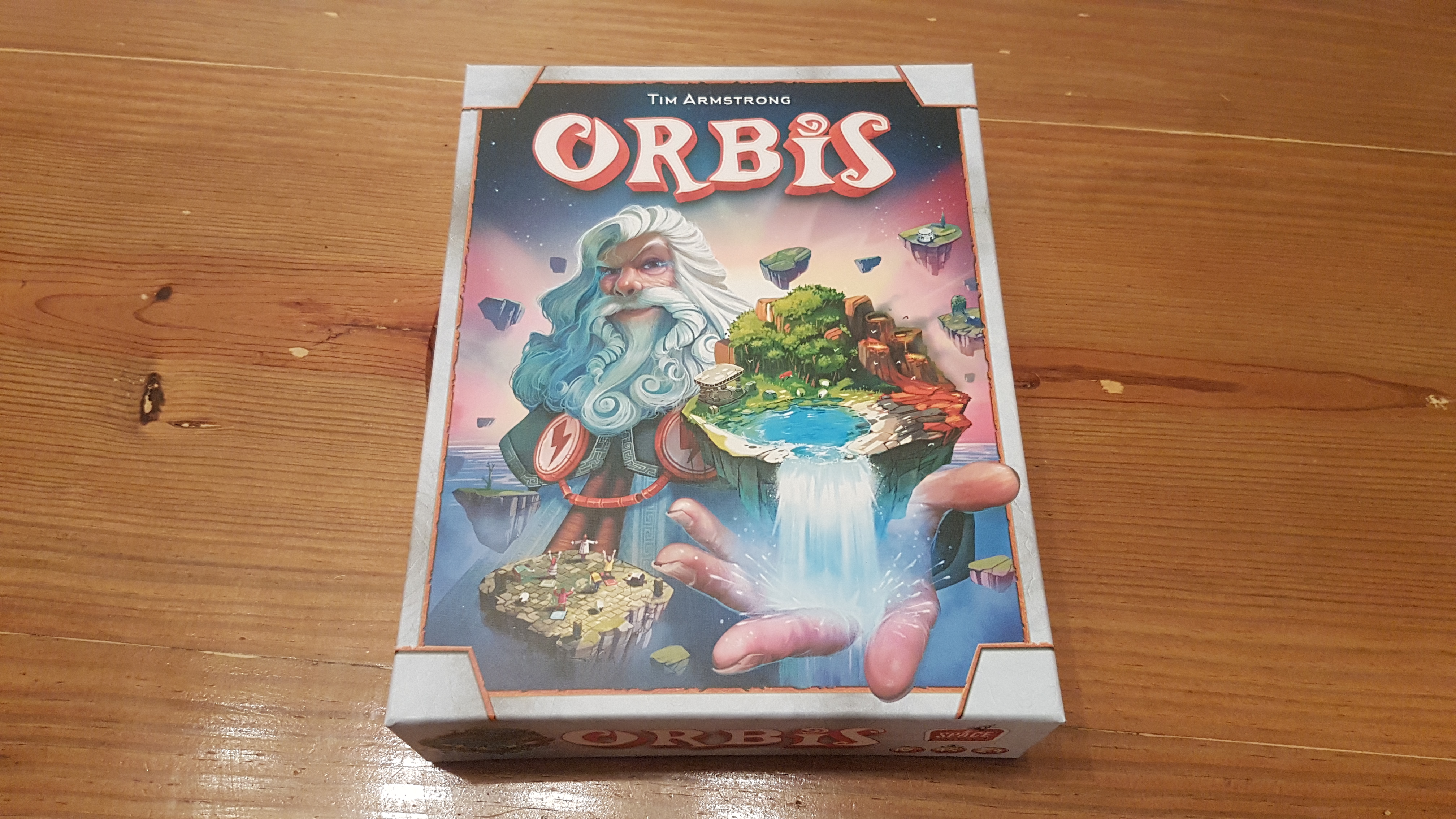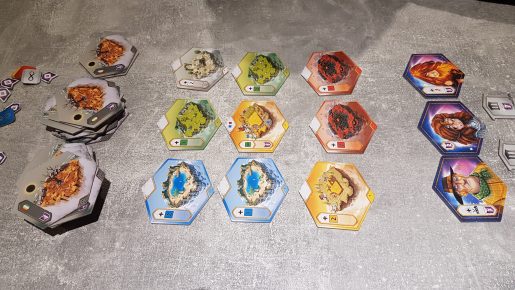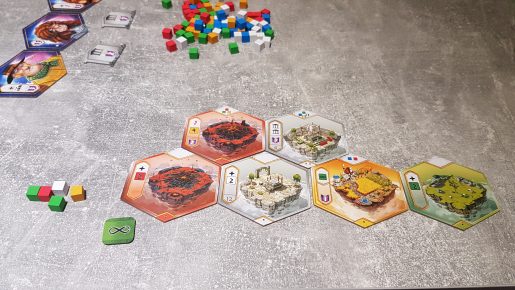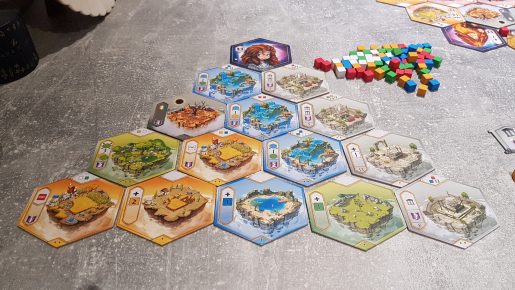Orbis is a hot of the press, tile placement board game from publisher Space Cowboys. Designed by Tim Armstrong, with art from Davide Tosello, the game is themed around constructing a world. Throughout the game players take up the role of a God who aims to construct a world full of worshipers, made up of different region types. Played over 15 rounds the game sees 2 – 4 players make only 15 decisions. Is this enough for the generation of a world to be enjoyable? Let’s find out!
Setup is quick with stacks of tiles of three distinct levels shuffled, a number of God tiles (equal to the player count plus one) placed in the middle of the table and a pile of worshipper cubes made within reach. From the level one pile 9 tiles are put into a 3×3 grid next to the God tiles and play is ready. Orbis is a relatively short and structured game that will always last 15 round. Across the rounds players will have built a pyramid from squished hexagons with a base of 5 reducing by one each level.
The aim of Orbis is to earn creation points (CPs) but how is that done? On a turn the active player gets to choose a tile from the 3×3 grid. If the tile has any worshipers on it they are gained and if it has a cost of worshipers this is when the player could to pay for it. If paid for the player can add the hexagon to their world face up. Once a tile is in the world is it locked in, with future tiles having to be either adjacent or built above a base of two tiles, whilst matching the colour of at least one of the below tiles. Face up tiles can score players points depending on what they offer or simply award worshiper cubes.
Some scoring conditions are instantly determined, such as having to remove worshipers from your supply for village tiles. Being unable to score doesn’t stop you taking a tile but a zero marker is placed over the points on the tile. If the player couldn’t afford the tile, was unable to follow the placement rules or decided not to pay then it gets flipped upside down, becoming a free wild colour tile. These Wilderness tiles are potentially great for scoring other tiles requirements as they are classed as any colour, though each wild tile loses the owner a point at the end of the game.
Before replacing the tile in the 3×3 grid any adjacent tiles to the claimed one gets a coloured worshiper cube matching the claimed tiles colour. Finally, the tile is replaced from the lowest level pile available. As expected, as the level increases the cost and potential reward also increases. The game continues around the table with players taking turns to claim a tile. At any point in the game a player can instead decide to take one of the available God tiles, which range from gaining 1 CP and 5 cubes instantly to 3 CP if the player has most scoring volcano tiles. Players are only allowed one God tile though so choose wisely. At the end of the game whomever has the most creation points wins!
There is a small amount of variation included in the box, with 10 God tiles ready to be shuffled and adorn the top of your pyramid shaped worlds. These provide different ways to score points, therefore each game can feel different, with different combinations of regions being stronger from one game to the next. These God tiles could have been improved by being double sided, to further this variety though.
The different types of region tiles score differently, which in combination with the placement mechanics can result in players looking to built with only a couple of tile types. This can limit players options though, especially if they specify too early on. By extension, over multiple different games you can have different objectives. These are very much minor difference though, with two games back to back feeling lacklusterly similar. The issue is somewhat exaggerated as every region tile included in the box will be available in a single four player game – with the same tiles removed for 2/3 player games.
As soon as you open Orbis the artwork from the tiles shines. Striking a wonderful balance between being distinct and bright colours, whilst not being a mere explosion of colour the pyramid shaped worlds created are beautiful. The details on each and every hex, from ready to erupt volcanoes to peaceful water zones, help form a magically vibrant world. Not every tile is unique but there are enough variations in design to keep things pleasant.
Unfortunately, the top quality production does not reach all aspects of the title, with a theme killing usage of cubes. Cubes are often used as resources in board games but I haven’t found them so theme destroying since Lords of Waterdeep. Just like in Lords of Waterdeep cubes are used to represent people, in Orbis’ case worshippers. It took less than a handful of rounds for the pretense of worshipers to be dropped in favour of simply referring to them as colours of cubes. This starts the ball rolling, like an Indiana Jones boulder, turning what could be a thematic title into something abstract, not helped by the infinity tiles of the different colours.
Orbis falls into the unfortunate rut of good games, being hard to get excited about but also hard to brutally criticise. The way the world builds up with the region type limitation is an interesting mechanic and a stunning pyramid world forms in front of you. There are different ways to score points, so light strategy changes from game to game are possible and the Gods minutely shake things up. There is just not enough difference from one game to the next to warrant playing the game back to back. The use of cubes is an understandable one but it opens the door for players to forget the theme and therefore the game itself. With so many great games available, and plenty of good ones, it just doesn’t reach the worldly heights needed to stand out.
[Editor’s Note: Orbis was provided to us by Asmodee UK for review purposes. The game is currently available on 365 Games for £24.99. It is also available from local UK board game stores, find your local store here]




